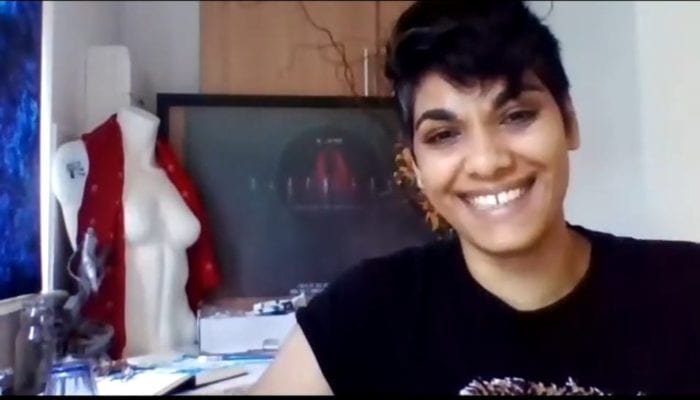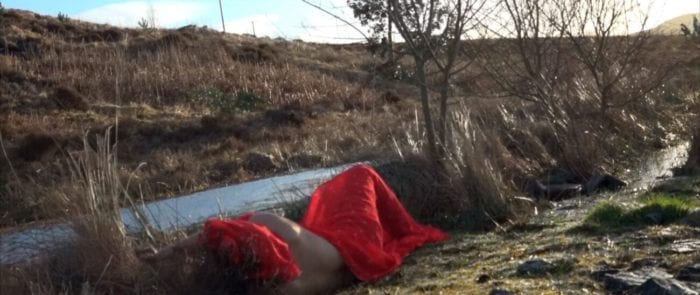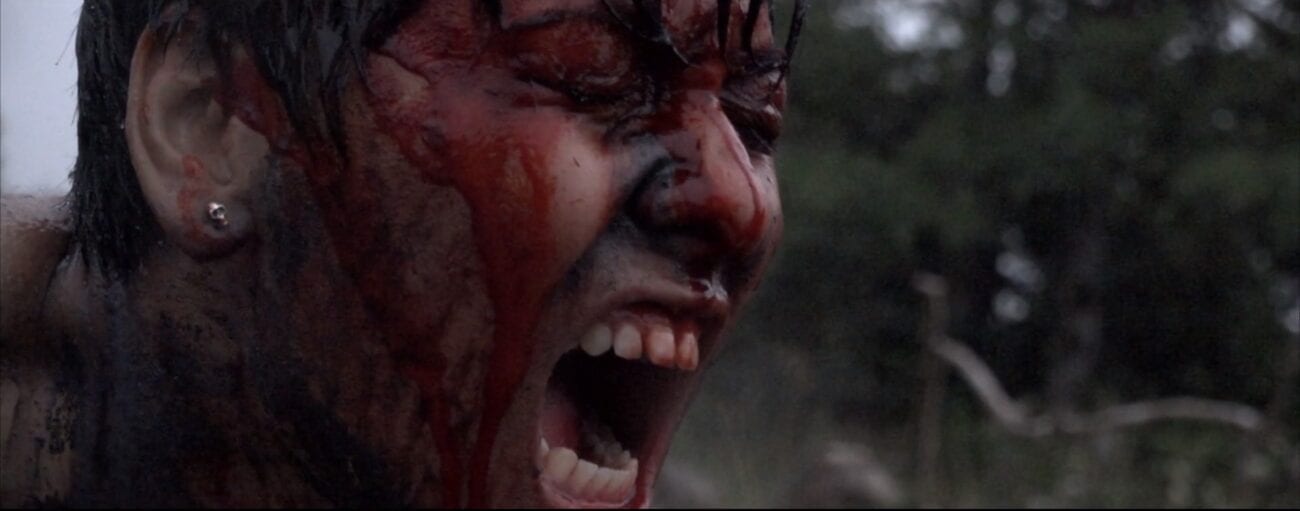Black Lake is a one-of-a-kind movie experience. It’s images and message stay with you long after the credits roll. This past week, I reviewed the film as part of our Salem Horrorfest 2020 coverage. I reached out to director K/XI to discuss everything from T-shirts, music, and her love of movies to handling cobras, supernatural set occurrences, and cycles of violence.
Sean Parker: First of all, how excited are you? I know the film has been going around from festival to festival, but how excited are you for people to actually see it?
K/XI: So we had our world premiere at the Women in Horror Film Festival in February, which was great. The timing was great, right before the pandemic hit globally. It was a crazy time, and it was a really special moment because the auditorium was packed out. People were crying in the Q&A! People were getting choked up and couldn’t get their questions out, and I thought, “Wow!” Some people really felt connected to this, and we had to give out a lot of hugs. We really had to comfort people, which was an amazing experience. So Salem is the second place to host a screening of Black Lake.
I wish I could have been there physically—going digital was a big deal for me. I actually pulled out of a lot of festivals because they were potentially going to screen it digitally, and I thought, “Nah I can’t do this. People are going to feel really sad in their homes, and I just want to hug them!” But because I follow [Salem Horrorfest] across social media platforms, I love their message. I love how politically involved they are, how vocal they are about social justice and I thought, “If there is going to be a festival that I want supporting this, championing this film, it’s got to be Salem.” Especially with the history of witches, it was just perfect. I’m really honored to have Black Lake screening there.

SP: You wore a couple of T-shirts at the start of the film, and they obviously have direct references inside the film. Were there any T-shirts that didn’t make the cut?
K/XI: No, everything made the cut, and I want to give a shout out to The Local Boogeyman who works with Rob Zombie and stuff. [Laughing] I’m actually wearing one of his T-shirts now! I’m very particular about materials and just the aesthetic of things. I love his T-shirts. Despite living in London, I get most of my T-shirts from “The Local Boogeyman” in the States.
So I emailed him and said, “Do you mind if I use some of your T-shirts in my movie?” and he said “Thanks for asking, sure!” So a lot of the T-shirts were supplied by him. With The Evil Dead T-shirt, I messaged Studio Canal for permission. They said, “Sure, let us know what the scene is. Send us a photo,” and they approved it. It was great to have that backing because there are a lot of movies where you see people wearing band T-shirts and I was like, I never see anybody wearing a movie T-shirt in a movie. And the film is a love letter to a lot of my favorite directors like Sam Raimi and David Lynch, of course. So it just had to be done.
SP: Aarya is an artist in the film. Were there any formal artworks that inspired the film?
K/XI: So, have you listened to the soundtrack independently of the film?
SP: Not yet—I was waiting to get it in the mail because I actually bought it on vinyl!
K/XI: Oh, fantastic! So to answer your question, the answer is yes. A lot of the track listings are named after famous pieces of art which inspired certain scenes. I’ll leave it at that. If you look into the names of the tracks, you’ll get a pretty extensive list there.
SP: To build on that, the soundtrack and score are beautiful. Given your proclivity for fantastic music, what are you listening to now that we should all listen to?
K/XI: So, funny enough because of the time of year it is—it’s the equinox, there’s a lot of change and things…Funny enough, as of yesterday I finally sunk my teeth into Lady Gaga’s Chromatica. I just needed something upbeat. It’s just that time of the year. Lady Gaga is actually one of the artists I credit in the end credits of Black Lake as a thank you. And there are many people in there like [David] Lynch and Angelina Jolie, Alexander McQueen—there’s a lot of artists who I absolutely love. Spiritually, I felt like they accompanied me on this journey through Black Lake, so it’s nice to be able to enjoy some of their work now. You caught me a little off guard with that one. I listen to a lot of Massive Attack and Bjork mainly.
SP: Black Lake uses a lot of nature imagery to create calmness throughout the violence. Why did you decide to approach this with an opposing equilibrium?
K/XI: You mention in the article about the elements. Black Lake is a deeply spiritual movie. Even the opening track to the film by Burning Tapes references the elements. I just felt like a lot of things that are usually said in movies can usually be said through surroundings and through the careful placement of those elements, because we are all made up of those elements. We see them everywhere. But a lot of the time we take it for granted: the scenery, the air, and the fire that warms us. I really wanted to just focus on those “little things” that are often missed. Which probably explains some of those longer takes of things because it’s like LOOK. Really look. Are you actually seeing that? It’s a return to home. A return to mother nature almost.

SP: Aarya says she needs to get out of the city at the start of the film and discusses with her aunt the strained relationship she has with her mother. I interpreted this through the course of the film as more of a cover story, for something obviously worse happening. After discussing that, she and her aunt also discuss the scarf. Is this a subconscious psychological inception, planting the seed for the rest of the film to grow out of?
K/XI: I guess because of the cultural focus, because I’m Asian, I really wanted Aarya to serve as almost like a role model and open up some of the cultural issues that are quite predominant in South Asian culture. The idea of a young South Asian woman leaving home is usually very taboo. Unless you’re leaving home to get married, it’s just not done. And the idea of being an artist…a South Asian woman being an artist, it’s like, “Oh, you failed! You couldn’t be a doctor?” I really wanted to highlight those things and say to people who have left home, or even just get away for a breather, or who are artists: It’s okay. It is okay to be those things and do those things.
So I really just wanted to highlight some of those cultural issues that are still present today. Despite that, you could be living in London, Pakistan, or India—you could be living anywhere, but these things are so culturally ingrained that people still have to deal with this on a daily basis.
SP: In a follow up to that, you’ve said that your initial shooting locations had to be abandoned all of a sudden. Did you find that there were cultural sensitivities given the nature of the film?
K/XI: Yes. So, the locations just kept changing. Some supernatural things happened, as well. One of the locations caught fire. That might be related to my first feature film, Maya, which I’ll be revisiting, as well. So people were just kind of like, “K, because you shot Maya here,” and a lot of supernatural things happened on the set of Maya, “people are very uncomfortable with the idea of a churail.” Because the idea of possession and Djinn, which is explored in Maya, is very…you know, you can’t see it. If a person is possessed, you can see the possessed state, but in terms of the thing possessing, you don’t see it. With the idea of a churail, which people still heavily believe in today, if one were to see a churail, you’re probably not going to live to talk about it. People are terrified of the concept.
So, funnily enough, I wanted to make use of my trip. I wanted to film some extra bits for a trailer I could put together. I went almost sight-seeing and I wound up in some pretty haunted places, and this is when I came across Naseema, the young village girl. She was literally a beggar girl. I gave her some money and asked her, “Could I take some photos of you?” because she was just so beautiful!
Everything kind of collapsed around me in terms of filming locations. I remember saying to my family, “You’re not going to like this, but I am going to go back to the Necropolis, find that girl, and she’s going to be in my movie. I’m going to film out there.” And that’s what I did. And it was a huge shift, the whole film changed—the whole experience changed!
I remember being in a car with some people I trusted. We took clothes, shoes, clean water, and suddenly we are providing this community with this stuff in exchange to do some filming. I felt great. That for me was just the highlight of Black Lake. That was an amazing moment.
…and I got to hold a poisonous cobra.
SP: Wait what?! What was that like?
K/XI: [laughing] Amazing! You get a lot of people in the Necropolis who play this instrument and they have cobras coming out of little baskets as you see in the opening credits of Black Lake. This cobra kept coming out towards me, and I asked this man, “Is it safe?” “Well,” he said, “It’s venomous. But it’s under my command.” And I thought, “Okay…” and I just let it kinda come towards me, and I held it. And all these other tourists are just like, “Look at that girl!” and I’m just there, holding this cobra thinking, “This is amazing!” So, yes, those two things were my favorite things.
SP: That’s awesome. I am not personally a snake guy myself, but I also believe they are misunderstood creatures.
K/XI: They are. That year, one of my favorite Bollywood actresses died. My favorite role of hers was in this iconic Bollywood film in which she is guided by cobras, she’s protected by them. So that moment was a very beautiful moment for me because I felt like I could use the cobras in the film as an homage to kind of say thank you. The whole film really is all about gratitude. So it was an amazing moment.

SP: There’s a moment in the film where Aarya’s watching René Laloux’s Fantastic Planet, about oppressive alien overlords and the humans they keep as pets. It’s also a big turning point in the film as Aarya has her first physical encounter with the churail. Where objects are used as tangible memories to explore prior abuse, is Aarya watching the film triggering to that as well?
K/XI: It was really important for me as someone who loves films. I had to have a scene in which Aarya is watching the movie, and I love French cinema. There’s also some French literature in the film which is what she is reading, Les Fleurs du mal, the flowers of evil. The reason I chose Fantastic Planet is that it is a direct reference to The Cell when Jennifer Lopez’s character watches Fantastic Planet when she’s getting ready for bed. I absolutely love Tarsem Singh as a director and that’s my way of saying thank you to him.
So what I realized when I was watching Fantastic Planet through, which is amazing, is the scene that I actually depict in the film when the two women with their long hair intertwined and they’re struggling—it’s that moment that obviously triggers the hair scene with Aarya and the rice. And I thought, “this is uncanny, this is perfect.”
SP: What was it like for you playing Aarya going through her on-screen transformation?
K/XI: I think we were both transforming at the same time. Originally, I did have another actress playing Aarya so I actually went through several people. The casting process was crazy. Originally over 500 people had applied for the role, just because people just hadn’t heard about a role like this before. And so a lot of women were excited. I interviewed a lot of women, who were like, “This kind of thing just doesn’t come along.” But when it was coming to the final stages of getting people on board, people were terrified. And a lot of South Asian women, especially knowing about the churail, were terrified. They were like, “Nope, Sorry!”
I had somebody drop out a month prior to the shoot. It was devastating. So we did actually shoot the entire film before I decided to get involved. I ran out of money, and I was in a really dark place. And I thought, “I need to do this. This has to be done. I can’t give up on this.” I got new people involved in terms of cast and crew and we just started all over again. I said, “Guys, I’m going to be Aarya.” And a lot of people just said, “K, you should have been Aarya all along because this was always your story.”
I was nervous because I love being behind a camera. I said to Sei-Kai [Leung], who is also a co-producer, “You’re the only one I can trust behind the camera! You understand somewhat what I want, and you’ll be patient.” So anytime I’m on-screen as Aarya, Sei-Kai is behind the camera. There are times I filmed myself because most of the time we had three people on set.
For me, when people say, “What was it like making Black Lake?” I often say, “The question should be, how did Black Lake make you?” I feel pretty transformed. It was an amazing experience. I had to get over a lot of my fears: fear of water, fear of bugs, all sorts of things. It was a pretty profound experience. And a lot of little things, because we filmed it over two years—would change not the end goal of the film but little things in between.
There was a cut, it was a very violent ending. There are some very violent scenes that got pulled out. As I got closer to the ending, I thought, “I don’t want this film to be remembered for the violence,” because it’s not about that. It’s ultimately about love.
SP: Do you have any guidance for those dealing with cycles of violence in their own way?
K/XI: It’s all about self. Only people in those situations know when they’ve had enough. For me, in all honesty, hand-over-heart, filmmaking saved my life. I remember a distinct moment in my life when I just thought, “I’ve had enough.” I remember I rented out some film equipment from when I was studying at University and I knew that if I went home that day, my whole life would change.
I would continue making some short films and in those films, I would get out everything I needed to say. I realized that it’s like an odor. Sometimes it’s not exactly what you say, but how you say it. Because sometimes people can’t hear you. So instead of verbally standing in front of somebody and saying, “this,” show them. And this applies to all sorts of people in your life, show them.
So for anybody that’s in that kind of situation, you know when you’ve had enough. And it’s about looking inward for happiness. Happiness is not outside of you; it is always inside of you.
A lot of regular moviegoers may watch Black Lake and are probably going to think, “Why doesn’t she run away? Why doesn’t she get in a car and drive back?!” and I think for me that’s why the movie T-shirts are important. Aarya watches movies, she knows how these things go. And the idea was about not responding to violence through violence.
So, there are people who are in their cycles of violence and in violent situations, and sometimes we feel like we need to help. Just because you are someone’s daughter or someone’s partner, you feel obligated to help them through that thing no matter how much it hurts you. But I think it’s important for people to know that your well-being comes first. You can’t help anybody if you can’t help yourself. Allowing yourself to be vulnerable and hurt that way is dangerous. So, I don’t think that anybody should feel that they have to do something that is detrimental to their health and spiritual well-being.
Black Lake will be playing at this year’s all-virtual Salem Horrorfest 2020 during its second weekend starting October 9th. All-access badges are also available and will allow you into all the premieres, panels, and more on both weekends.



